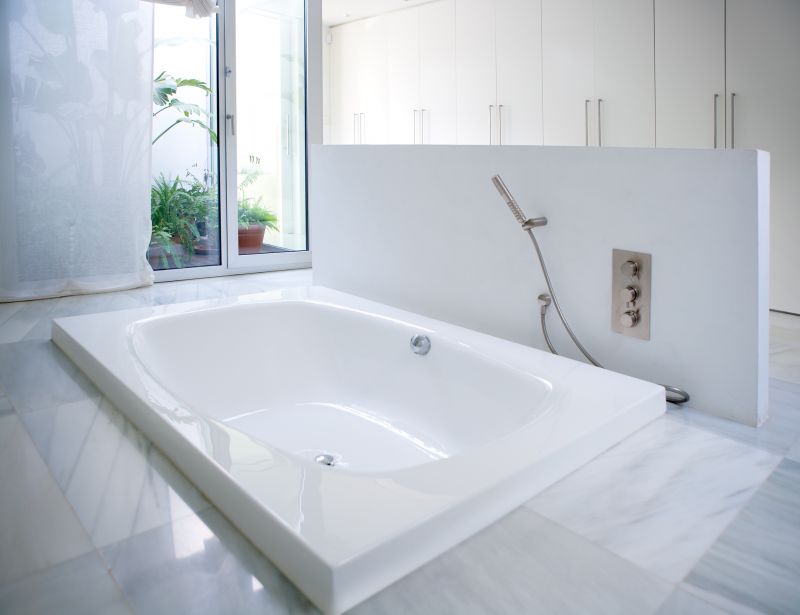Expert Picks For Bathtub Refinishings To Achieve a Perfect Finish
Get insights into the most reliable and effective products used by professionals to restore and refinish bathtubs seamlessly.
 Bathtub refinishing is a practical solution for restoring the appearance and functionality of worn or stained tubs without the need for complete replacement. This process typically involves cleaning the existing surface thoroughly, repairing any chips or cracks, and applying a specialized coating that adheres well and provides a smooth, durable finish. Many homeowners in Fort Collins, CO, opt for bathtub refinishing to refresh their bathrooms efficiently and cost-effectively.
Bathtub refinishing is a practical solution for restoring the appearance and functionality of worn or stained tubs without the need for complete replacement. This process typically involves cleaning the existing surface thoroughly, repairing any chips or cracks, and applying a specialized coating that adheres well and provides a smooth, durable finish. Many homeowners in Fort Collins, CO, opt for bathtub refinishing to refresh their bathrooms efficiently and cost-effectively.
Top Overall Option
Comprehensive Bathtub Refinishing Kit
A complete refinishing kit that includes primer, epoxy coating, brushes, and protective gear offers a comprehensive solution for those seeking a DIY approach. These kits are designed to provide all necessary components in one package, simplifying the process and helping to achieve a uniform, smooth finish. They are suitable for various bathtub materials and can be used by homeowners with some DIY experience. While results depend on proper application and surface preparation, these kits are valued for their convenience and versatility.
Types of Products For Bathtub Refinishings
Epoxy Coatings
Epoxy coatings are known for their strong adhesion and durable finish, making them a popular choice for bathtub refinishing projects.
Acrylic Paints
Acrylic-based paints provide a smooth, glossy finish and are easy to apply, suitable for DIY refinishing.
Urethane-Based Coatings
Urethane coatings offer flexibility and chemical resistance, helping to extend the lifespan of refinished tubs.
Refinishing Primer
Primers improve adhesion of the topcoat and help ensure a uniform finish across the surface.
Spray-On Coatings
These coatings allow for quick and even application, ideal for those seeking a professional-looking finish.
Refinishing Kits
All-in-one kits include multiple components such as primers, topcoats, and applicators for DIY projects.
Repair Patches and Fillers
Used to fix chips, cracks, and surface imperfections before applying the final coating.
Anti-Slip Additives
Mixed into coatings to provide a textured surface for safety and slip resistance.
Protective Sealers
Sealers help protect the refinished surface from stains and damage over time.
Cleaning and Surface Prep Solutions
Specialized cleaners and etching solutions prepare the surface for optimal coating adhesion.
Brush and Roller Sets
Tools designed for even application of coatings and primers.
Protective Gear
Masks, gloves, and coveralls ensure safety during the refinishing process.
Heat Guns and Curing Devices
Assist in drying and curing coatings faster for a durable finish.
Popular Choices
Widely used for their adhesion and durability, suitable for various bathtub materials.
Favored for their ease of application and glossy finish, popular among DIY enthusiasts.
Provide a quick and even application, often chosen for professional-looking results.
Popular for convenience, these kits include necessary components for a complete project.
Commonly used to address surface imperfections before refinishing.
Increasingly chosen for safety considerations in wet environments.
Essential for ensuring proper adhesion and long-lasting results.
Popular for extending the longevity of refinished surfaces.
Often selected to improve coating adhesion and surface uniformity.
Brushes, rollers, and spray guns are frequently used for their ease of application.
Masks and gloves are standard for safe application, especially in enclosed spaces.
Help speed up the drying process, preferred in busy renovation schedules.
The variety of products available for bathtub refinishing includes epoxies, acrylic coatings, urethane-based paints, and specialized primers. Each type offers different benefits in terms of adhesion, durability, and ease of application. Choosing the right product depends on the current condition of the tub, the desired finish, and the level of expertise of the person performing the refinishing.
Proper surface preparation is crucial for achieving long-lasting results. This often involves cleaning with specific cleaners, sanding or etching the surface to create a rough texture, and ensuring the area is well-ventilated during application. Some refinishing kits include all necessary components, making DIY projects feasible, while others may require professional application for optimal results.
In addition to the refinishing kits, there are also various accessories such as brushes, rollers, masks, and protective gear that can help improve the application process. Considering the specific needs of your bathtub—such as size, material, and existing damage—can guide you in selecting the most appropriate products for your refinishing project.
Key Buying Considerations
- Surface Compatibility: Ensure the product is suitable for your bathtub's material, such as porcelain, acrylic, or cast iron.
- Durability: Look for coatings that offer resistance to chipping, staining, and chemical damage.
- Ease of Application: Consider whether the product is designed for DIY use or professional application.
- Drying and Curing Time: Check how long the product takes to dry and cure for planning your project timeline.
- Finish Type: Decide between matte, semi-gloss, or high-gloss finishes based on your aesthetic preferences.
- Preparation Requirements: Some products require extensive surface prep, while others are more forgiving.
- Coverage Area: Verify the coverage per container to estimate how much product you'll need.
- Safety Precautions: Ensure proper ventilation and protective gear are available and used during application.
- Compatibility with Repairs: If addressing surface damage, select products compatible with patching materials.
- Cost and Budget: Balance the quality and features with your budget constraints.
- Environmental Conditions: Consider humidity and temperature conditions that may affect application and curing.
- Long-Term Maintenance: Check if the product requires special cleaning or maintenance routines.
- User Reviews and Ratings: Read feedback from other users to gauge ease of use and satisfaction.
- Availability of Accessories: Confirm that necessary tools and accessories are accessible for your project.
